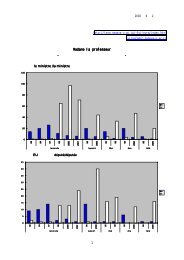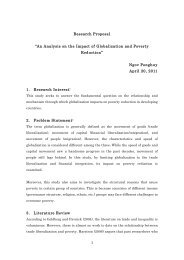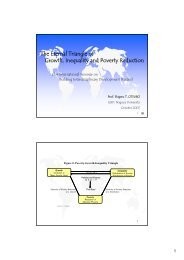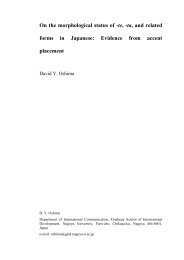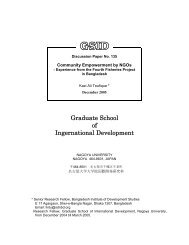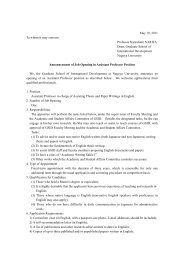Report
Report
Report
You also want an ePaper? Increase the reach of your titles
YUMPU automatically turns print PDFs into web optimized ePapers that Google loves.
176 QUANTIFICATION OF BENEFITS FROM ECONOMIC COOPERATION IN SOUTH ASIA<br />
is growing basically due to prepaid mobile scheme,<br />
which has crossed the 1.5 mn mark at the end of this<br />
quarter.<br />
Since 1995, Nepal has initiated the involvement of<br />
the private sector in the development of the telecommunication<br />
services. To make this work more systematically<br />
and regularly, the telecommunication of 1997 and<br />
telecommunication regulation of 1998 had been<br />
implemented. Nepal Telecommunications Authority has<br />
been established as an autonomous regulatory body<br />
on 4 March 1998.<br />
There are several issues pending with the regulator<br />
which include, VoIP and internet telephony legalisation,<br />
mechanism for the allocation/assignment of spectrum<br />
and frequency fee determination for WiMax band,<br />
amendment of the Telecom Act 2053, disbursal of the<br />
rural telecom development fund (RTDF) for providing<br />
telecom service in rural areas, issues regarding the use<br />
of Nepal electricity authority’s fibre network by other<br />
licensed telecom operators and use of VPN by ISPs to<br />
provide data communication service, mechanisms to<br />
encourage ISPs in rural areas of Nepal.<br />
Table 15.7 Key Telecom Indicators for Nepal<br />
Population 28<br />
Fixed lines 0.764353<br />
Fixed teledensity 2.73%<br />
Mobile phones 1.57<br />
Mobile density 5.61%<br />
Source: http://www.nta.gov.np/<br />
In 2004, Nepal undertook the following commitments:<br />
• For voice telephony:<br />
– No limitation on number of service providers<br />
will exist on January 2009. However, foreign<br />
participation permitted through a joint venture<br />
with up to 80% equity participation.<br />
• For circuit switched data transmission services<br />
• For facsimile services<br />
• For private leased circuit services:<br />
– No limitation except that foreign participation<br />
permitted through a joint venture with up to<br />
80% equity participation.<br />
• For cellular mobile telephony:<br />
– By 2004 two mobile operators will be licensed<br />
– No limitation on number of service providers<br />
will exist on January 2009; however, foreign<br />
participation permitted through a joint venture<br />
with up to 80% equity participation.<br />
– Mobile technology will not be prescribed but<br />
will be left to the choice of the operator upon<br />
the date of accession.<br />
• Additional commitments taken are as follows:<br />
Nepal has committed to the reference paper. The<br />
gap between the applicable regime and commitments<br />
for Nepal is the minimum among SAFTA<br />
countries that have made commitments under<br />
GATS.<br />
Of the other two countries, Bhutan is not a member<br />
of WTO while the Maldives has not made any commitments<br />
in Telecom.<br />
Bhutan<br />
Major reforms have been taking place in Bhutan,<br />
especially in the telecommunications and other ICT<br />
service sectors, for the last few years. In principle, the<br />
functionality of regulation, policy, and operations has<br />
been segregated from one other with the enactment of<br />
the Bhutan Telecommunication Act 1999. As the result<br />
of this Act, the once-government owned department<br />
of telecom has been transformed into a state-owned<br />
corporation and a separate regulatory agency has been<br />
created within the ministry. As an initiative of government<br />
restructuring, the former ministry of communication<br />
has been bifurcated into two separate ministries,<br />
namely, ministry of information and communication<br />
and ministry of work and human settlement, in June<br />
2003. The government of Bhutan sees telecommunications<br />
and other ICT services as important and essential<br />
catalysts for the overall development of the country. In<br />
order to reap the fruits of ICT for development, a<br />
committee consisting of different ICT players, including<br />
members from government, private investors,<br />
NGOs, and donor entities, was established and given<br />
the task to discuss and develop a national ICT policy<br />
and strategies in 2004. The committee has recognised<br />
the importance of the telecommunications infrastructure<br />
for the overall development of ICT related<br />
services, and it is felt that there is a need to liberalise<br />
and introduce competition in the telecommunications<br />
market by 2007. Though policies and strategies have<br />
been developed for opening the Bhutanese telecommunications<br />
market, actual mechanisms for<br />
opening up the market have not yet been formulated.<br />
Currently, the telecom scenario is not very good with<br />
overall teledensity at mere 4.03%. But with policy<br />
changes in place we may see a spurt in growth in the<br />
coming years.






